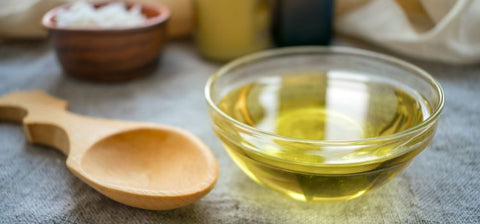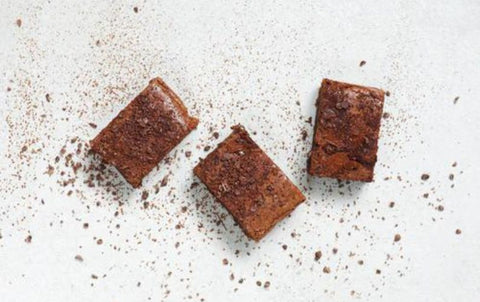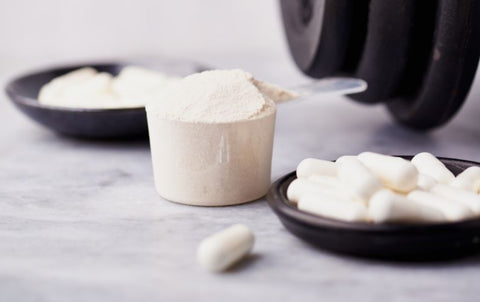MCT oils are gaining popularity while coconut oil gains skepticism. Both may provide benefits, but MCT oils appear to have more of an impact with less risk.
Coconut oil has long been praised as a superfood cure-all, but what is MCT oil and why are experts so concerned that people understand the difference between the two?
First off, you may be wondering what MCT even is. MCT stands for medium-chain triglycerides, which are types of fat whose carbon chains have between six and 12 carbon atoms. Unlike long-chain triglycerides (LCTs), your body can easily absorb and break down MCTs.
These fats aren't only present in MCT oil, which sparks the debate between MCT oil and coconut oil. Keep reading to learn more!
MCT Oil vs. Coconut Oil: Benefits and Risks
Both MCT and coconut oil contain helpful medium-chain triglycerides, but these interact with your body differently. Before we go into the benefits and risks, let's look at each oil to understand better what they are.
What is MCT Oil?

MCT oil is a concentrated source of medium-chain triglycerides made from coconuts or palm kernel oil. Some people have moved away from coconut oil in favour of pure MCT because of its health benefits.
There are four types of MCTs:
- Caproic acid (C6)
- Caprylic acid (C8)
- Capric acid (C10)
- Lauric acid (C12)
The two most used MCT oils are caprylic and capric acid.
Coconut oil also contains MCTs, which is how they became so popular. In fact, a 2003 study on the health benefits of MCTs started this coconut fever. This has caused some people to get their wires crossed when researching. Let's dig in a bit deeper and outline the differences between the two oils.
Coconut oil MCT oil may sometimes be made from coconuts. First off, half the fatty acids in coconut oil are lauric acid. Secondly, only 14 percent of the fats are medium-chain triglycerides, the rest being long-chain ones.
Lauric acid helps increases good cholesterol more than all other fatty acids, which may help with heart health. A lot of people praise coconut oil because of lauric acid and its benefits.
Next to lauric acid and the other MCTs, 25 percent of the fatty acids are the long-chain triglycerides, myristic and palmitic acid. These fats may raise your risk for heart disease as they increase bad cholesterol without affecting good cholesterol. There is hope, however, that the lauric acid and other components are enough to balance these effects.
Is Coconut Oil Good for You?
Coconut oil may be full of saturated fats and contain LCTs, but there is still evidence that it is useful. Some believe the benefits of lauric acid outweigh the negative aspects, and science backs this up.
Coconut oil may not be the cure-all, but it's still a good substitute for regular butter. Dietitians recommend alternating between types of oils. For example, you could incorporate olive, avocado, and coconut oil into your diet.
Coconut Oil for Skin

If you're uneasy about incorporating coconut oil into your diet, you may still reap the rewards by using it in your skincare routine.
Coconut butter is made from pureed coconut meat which includes its oil. You can use this as a moisturizer or a soothing makeup remover.
If you occasionally enjoy a massage, you can also use coconut oil instead of lotion. If you're not into DIYs, you can look at our selection of
MCT Oil Benefits
While there is controversy over the effectiveness and safety of coconut oil, multiple sources and studies support the health benefits of MCT oil.
MCT oil may help increase your body's release of peptide YY and leptin, which are hormones that make you feel full. This means you need less food to feel satisfied and full. However, a study found that the oil sometimes stimulates ghrelin and neuropeptide Y, which makes you feel hungry.
Because your body easily absorbs and breaks down MCTs, the oil can travel straight to your liver, where it's quickly converted into energy.
Taking some oil before exercising may also help your body convert fat into energy instead of carbs. There isn't enough data to tell if MCT oil enhances performance, but it doesn't appear to hinder it. You could add a scoop of this
Final Thoughts
MCT oil and coconut oil both have their positives and negatives. You should pick between the two based on which aligns best with your personal needs.
Important Note: When making adjustments to your diet, you may want to consult a healthcare professional who can provide personalized advice based on your health and goals.
Finally, comment below with your favourite ways to include MCT and coconut oil in your wellness routine!
References:
- https://www.healthline.com/nutrition/mct-oil-101
- https://www.healthline.com/health-news/coconut-oil-superfood-or-poison
- https://www.healthline.com/health/coconut-oil-may-be-fattening
- https://www.healthline.com/nutrition/saturated-fat-types
- https://www.healthline.com/nutrition/why-is-coconut-oil-good-for-you
- https://www.healthline.com/health/food-nutrition/coconut-oil-vs-coconut-butter#Cooking-with-coconut-oil-and-coconut-butter
- https://www.healthline.com/nutrition/mct-oil-benefits






